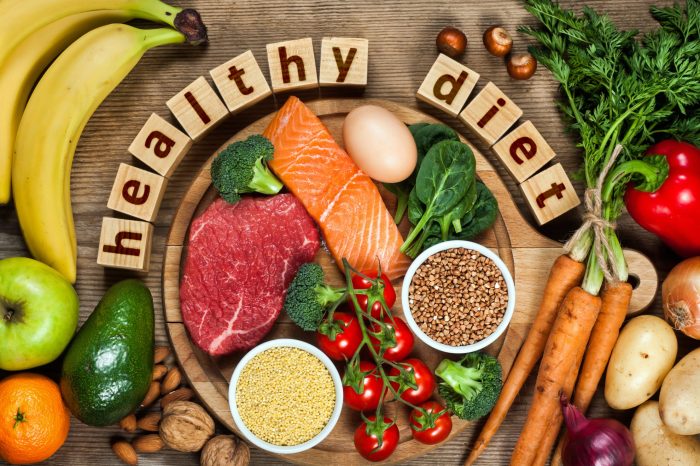Balanced diet is not just a trend, it’s a lifestyle. Dive into the world of nutrition and wellness as we explore the importance of maintaining a balanced diet for a healthier and happier you.
Importance of a Balanced Diet

Eating a balanced diet is essential for maintaining overall health and well-being. It provides the necessary nutrients that our bodies need to function properly and stay healthy. A balanced diet consists of a variety of foods in appropriate portions, ensuring that we get the right amount of carbohydrates, proteins, fats, vitamins, and minerals.
Impact on Physical Health
A balanced diet plays a crucial role in maintaining a healthy weight, reducing the risk of obesity, and preventing chronic conditions such as heart disease, diabetes, and high blood pressure. By consuming a variety of fruits, vegetables, whole grains, lean proteins, and healthy fats, we can fuel our bodies with essential nutrients and promote optimal physical health.
Impact on Mental Health
In addition to physical health benefits, a balanced diet can also have a positive impact on mental health. Nutrient-rich foods can help improve mood, boost energy levels, and enhance cognitive function. Consuming omega-3 fatty acids found in fish, for example, can support brain health and reduce the risk of depression and anxiety.
Longevity and Disease Prevention
Maintaining a balanced diet is linked to longevity and disease prevention. By nourishing our bodies with a variety of nutrients, we can strengthen our immune system, reduce inflammation, and lower the risk of developing chronic diseases. A diet rich in antioxidants, vitamins, and minerals can help protect cells from damage and promote longevity.
Components of a Balanced Diet

Eating a variety of foods that provide essential nutrients is key to maintaining a balanced diet. Let’s explore the main components and their importance in detail.
Carbohydrates
Carbohydrates are the body’s main source of energy, especially for the brain and muscles. They are found in foods like whole grains, fruits, and vegetables. Including complex carbohydrates in your diet can help regulate blood sugar levels and keep you feeling full longer.
Proteins
Proteins are essential for building and repairing tissues in the body. They also play a role in hormone production and immune function. Good sources of protein include lean meats, poultry, fish, eggs, dairy products, legumes, and nuts.
Fats
Healthy fats are important for brain function, cell growth, and energy. They also help absorb certain vitamins and minerals. Foods like avocados, nuts, seeds, and olive oil are rich in unsaturated fats that can benefit heart health when consumed in moderation.
Vitamins
Vitamins are essential for various bodily functions, such as immune support, vision, and bone health. Different vitamins can be found in a range of foods, including fruits, vegetables, whole grains, dairy products, and lean proteins.
Minerals
Minerals are necessary for maintaining proper fluid balance, forming strong bones, and transmitting nerve impulses. Sources of minerals include leafy greens, nuts, seeds, dairy products, seafood, and whole grains.
Designing a Balanced Diet Plan
Creating a personalized balanced diet plan is crucial for meeting individual needs and goals. It involves considering factors such as age, gender, activity level, and any specific dietary requirements.
Tips for Balancing Different Food Groups
- Include a variety of fruits and vegetables in your meals to ensure you get a range of vitamins and minerals.
- Incorporate lean proteins such as poultry, fish, tofu, or legumes to support muscle growth and repair.
- Choose whole grains like brown rice, quinoa, and whole wheat bread for fiber and sustained energy.
- Don’t forget healthy fats from sources like avocados, nuts, seeds, and olive oil for heart health.
- Limit processed foods, sugary drinks, and excessive salt to maintain overall health.
Strategies for Incorporating Variety and Moderation
- Experiment with different recipes and cooking methods to keep meals exciting and flavorful.
- Practice portion control by using smaller plates and being mindful of serving sizes.
- Plan your meals ahead of time to ensure you have a balanced mix of nutrients throughout the day.
- Allow yourself occasional treats or indulgences to prevent feelings of deprivation and promote a healthy relationship with food.
Benefits of a Balanced Diet
Eating a well-balanced diet has numerous benefits that go beyond just physical health. It plays a crucial role in maintaining mental well-being and sustaining energy levels throughout the day.
Improved Digestion and Gut Health, Balanced diet
A balanced diet rich in fiber, fruits, vegetables, and whole grains can aid in better digestion and promote a healthy gut microbiome. This can help reduce bloating, constipation, and other digestive issues, leading to overall improved gut health.
Boosted Immunity
By consuming a variety of nutrient-dense foods, such as colorful fruits and vegetables, lean proteins, and healthy fats, you can strengthen your immune system. A balanced diet provides essential vitamins, minerals, and antioxidants that help fight off infections and keep you healthy.
Supports Weight Management
Maintaining a balanced diet can help you achieve and sustain a healthy weight. By incorporating a mix of macronutrients in appropriate portions, you can regulate your calorie intake and prevent overeating. This can lead to gradual, sustainable weight loss or maintenance.
Success Stories and Case Studies
There are numerous success stories and case studies of individuals who have experienced significant improvements in their overall health by adopting a balanced diet. From weight loss transformations to increased energy levels and improved mental clarity, these stories showcase the positive impact of fueling your body with the right nutrients.
Common Myths and Misconceptions about Balanced Diets
When it comes to balanced diets, there are several myths and misconceptions that can lead to confusion. It’s important to debunk these myths and provide accurate information to help individuals make informed choices about their nutrition.
Carbs Are Bad for You
One common myth is that carbohydrates are bad for you and should be completely avoided. In reality, carbohydrates are an essential macronutrient that provides energy for our bodies. The key is to choose complex carbohydrates like whole grains, fruits, and vegetables over refined carbs like white bread and sugary snacks.
Skipping Meals Will Help You Lose Weight
Another misconception is that skipping meals is an effective way to lose weight. However, skipping meals can actually slow down your metabolism and lead to overeating later on. It’s important to eat regular, balanced meals to support your weight loss goals in a healthy way.
You Can’t Eat Any Junk Food on a Balanced Diet
While it’s true that a balanced diet should prioritize whole, nutrient-dense foods, it’s also important to allow yourself some flexibility. You can still enjoy your favorite treats in moderation while focusing on incorporating plenty of fruits, vegetables, lean proteins, and whole grains into your daily meals.
All Fats Are Unhealthy
Not all fats are created equal, and some fats are actually essential for overall health. Healthy fats found in foods like avocados, nuts, and olive oil can support heart health and brain function. It’s important to include these healthy fats in your diet while minimizing saturated and trans fats.

